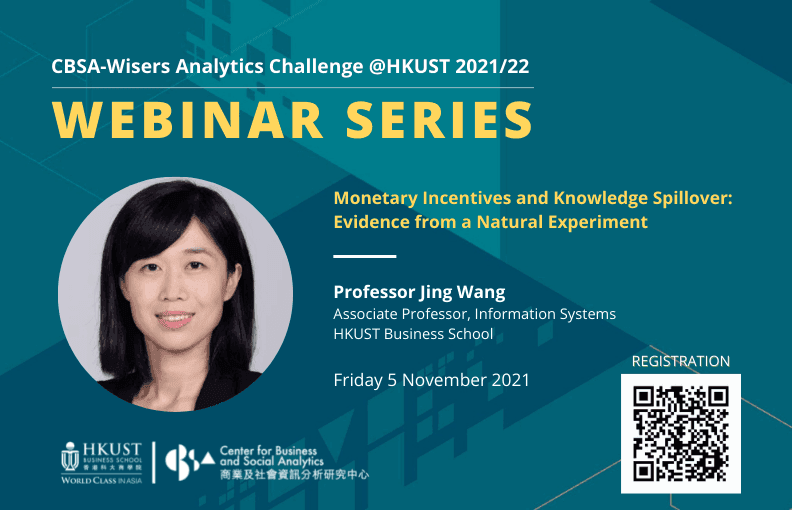
Posted on: Fri Nov 05 2021

TOPIC
Monetary Incentives and Knowledge Spillover: Evidence from a Natural Experiment
DATE AND TIME
Friday 5 November 2021, 2:00pm - 3:00pm
MATERIAL
Professor Jing Wang's presentation deck is available here.
ABSTRACT
We examine how the introduction of monetary incentives by a knowledge-sharing platform affects the non-rewarded knowledge activity on the platform. Our setting is a question-and-answer platform that provides monetary incentives for holding live talks. Using a combination of coarsened exact matching and difference-in-differences estimation techniques, we find that the launch of the paid feature creates a positive spillover effect on the hosts’ free contributions, specifically, 9.4%–40.8% more answers, in the short run when compared with non-hosts. The paid feature did not result in any significant change in the quality of answers. We suggest reputation building is one plausible mechanism underlying the spillover. Additional analyses reveal the spillover effect is negative for short-lived hosts in the long run, indicating possible crowding out of free contributions. The positive spillover effect for long-lived hosts lasts longer but is also reduced over time. Our findings suggest that introducing monetary incentives can be a viable business model for knowledge platforms to stimulate user contributions in both paid and related unpaid activities. Yet, platform owners should be cautious about the potential negative spillover after users stop participating in the paid activity and develop effective strategies to maintain users’ long-term interests in the paid program.
KEYWORDS
Online Q&A Communities, Monetary Incentives, Spillover Effect, Reputation Building, Crowding-out
SPEAKER BIOGRAPHY
Jing Wang is an Associate Professor at the School of Business and Management, Hong Kong University of Science and Technology. She received her Ph.D. in information systems from the Stern School of Business, New York University. Her research interests include crowdsourcing, online labor markets, crowdfunding, user-generated content, and data mining. Prof. Wang’s work has appeared in Proceedings of the National Academy of Science, Management Science, Information Systems Research, Journal of Management Information Systems, Data Mining and Knowledge Discovery, and several top Computer Science conferences. She has received the ISS Management Science Best Paper Award in 2020. She currently serves as an associate editor at MIS Quarterly.
ABOUT THE WEBINAR SERIES
This is part 5 of a 5-part webinar series featuring leading academic experts in big data analytics, information systems, machine learning, data mining, and large-scale data processing. Students interested in the CBSA-Wisers Analytics Challenge @HKUST 2021/22 are highly encouraged to attend the webinars.
Prof. Yang highlights enterprise AI breakthrough at HKUST Unicorn Day, showcasing LayerZero AI's custom embedding technology.
Prof. Yi Yang, Director of the Center, joins industry leaders in a panel discussion on cutting-edge GenAI risk management strategies during the launch of the second cohort of the Generative AI (GenAI) Sandbox initiative held on 28 Apr 2025.
At the closing Pitch Fest of the first-ever Web3 Ideathon, top tertiary student teams showcased their groundbreaking Web3 concepts to industry experts.